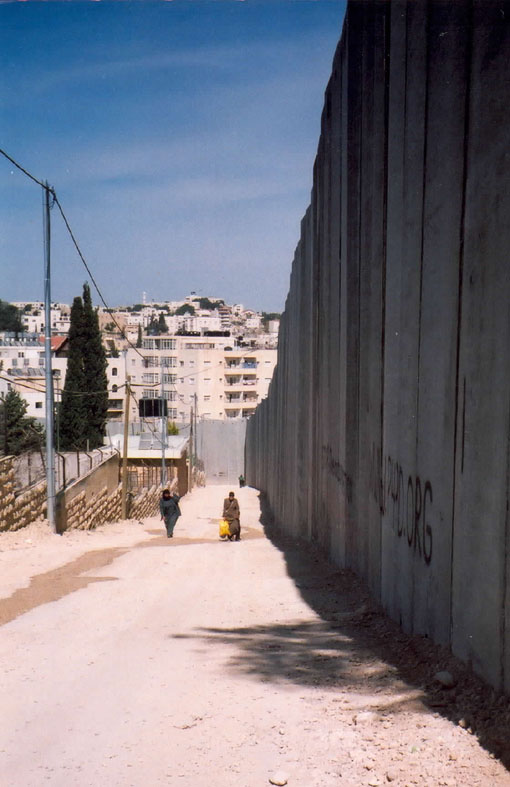Palestinian fighters killed two Israeli settlers near the West Bank city of Hebron last Friday morning.
Palestinians in a speeding car opened fire at three Israeli hikers near the Israeli settlement of Telem, close to the Palestinian village of Beit Kahil, killing two of them.
The armed wing of Islamic Jihad, the Al-Quds Brigades, claimed responsibility for the attack in a press statement.
Afterwards Israeli military forces were deployed at the site of the shooting.
They searched the area for the assailants and sealed the entrances to the city of Hebron, while helicopters flew overhead.
Earlier, seven Palestinian activists had been killed and 17 wounded on Thursday night and Friday morning, in four separate Israeli air-strikes in the Gaza Strip.
Among the dead were a number of prominent leaders and fighters of the Al-Quds Brigades.
Strikes also targeted fighters affiliated with the Hamas military wing, the Al-Qassam Brigades, in Khuza’a, near Khan Younis.
One Al-Qassam Brigades fighter was killed in that attack and five others injured.
Earlier, an airstrike killed forty-three-year-old Al-Quds Brigades leader Muhammad Abu Mirshid.
On Thursday, Israeli warplanes bombed the city of Khan Younis, killing Al-Quds Brigades field commander Muhammad Al-Masri, Al-Quds Brigades activist Haytham Abu Al-Ula, and Al-Qassam Brigades activist Hani Ramzi, and injuring ten others.
That airstrike also destroyed a three-story house belonging to Kahn Younis resident Ahmad Abu Tair.
Yet another Israeli strike targeted a car in the Al-Bureij refugee camp in the central Gaza Strip in which three Al-Quds Brigades activists were travelling.
Two of the Palestinian fighters were killed and the third was wounded.
A spokesman for the Al-Quds Brigades named the deceased as Muhammad Ahmad Abu Hassanain and Muhammad Fawzi Abu Hassanain, both from An-Nuseirat refugee camp.
Undercover Israeli forces killed a bodyguard assigned to protect the head of the Palestinian negotiating team, former Prime Minister Ahmad Qurei, in the West Bank town of Beituniya, near Ramallah on Friday morning.
The victim was twenty-three-year-old Mu’tasim Ash-Sharif, an officer in the Palestinian Presidential Guards, the elite 17 Forces and one of Qurei’s personal guards.
Witnesses said that the undercover Israeli soldiers stormed Ash-Sharif’s house in Beituniya and shot him.
The witnesses said Ash-Sharif did not resist his attackers.
Ash-Sharif died in an ambulance en route to the government hospital in Ramallah.
Ash-Sharif was not considered ‘wanted’ by Israel and former prime minister Qurei was not in the vicinity at the time of the attack.
Meanwhile, more than one thousand Muslim pilgrims from the Gaza Strip are stranded at the Jordanian Red Sea port of Aqaba because Egyptian Authorities are demanding that they agree to re-enter the Gaza Strip through the Israeli-controlled Kerem Shalom crossing, instead of the Palestinian-controlled Rafah crossing, through which they left.
But many of them know that they would never be allowed back into Gaza through an Israeli-run checkpoint.
Earlier in December, the Hamas-led government of the Gaza Strip secured the passage of the Palestinian pilgrims for the Hajj to Mecca.
Among the stranded pilgrims are dozens of officials affiliated with Hamas and other political factions, who will not be allowed through an Israeli-controlled checkpoint.
Earlier last week, Israeli Foreign Minister Tzipi Livni accused Egypt of aiding smugglers who allegedly move weapons and people into the Gaza Strip.
Israeli officials took particular exception to an apparent deal between the Hamas government and Egypt to allow the pilgrims through Rafah crossing to attend Hajj.
Last Thursday Egyptian President Hosni Mubarak accused Israel of fabricating a videotape that allegedly showed the smugglers at work.
The Al-Quds Brigades, claimed responsibility on Thursday night for launching a homemade projectile at the Israeli city of Ashkelon, north of the Gaza Strip.
They said in their statement that the shelling was in retaliation for the assassination of one of their leaders, Abu Mirshid, who was killed in an Israeli attack on Thursday.
Separately, the An-Nasser Salah Addin Brigades, the military wing of the Popular Resistance Committees, also said they had launched a homemade projectile at Ashkelon.
They said in their statement that the shelling was an act of retaliation for a series of assassinations of resistance fighters in the Gaza Strip.
The Al-Quds Brigades claimed responsibility for launching two explosive devices weighing 140 kilograms each at an Israeli military jeep in the evacuated Israeli settlement of Dugit, at the northern end of the Gaza Strip on Thursday.
A joint force of Al-Quds Brigades, the Popular Front for the Liberation of Palestine’s (PFLP) Abu Ali Mustafa Brigades, and the Fatah-affiliated Sacred Jihad Brigades, participated in the operation.
A statement released by the Al-Quds Brigades claimed that the jeep was completely destroyed and all its occupants were killed.
The statement added that the operation was retaliation for ongoing Israeli aggression against the Gaza Strip and the West Bank, and in retaliation for the Israeli assassination of Al-Quds Brigades leaders.
Israeli warplanes assassinated Al-Quds brigades General Commander Majid Al-Harazin on December 18th.
Palestinian and foreign peace activists demonstrated against the construction of the Israeli Apartheid Wall south of the West Bank city of Bethlehem on Friday.
The Israeli army violently blocked the demonstrators from reaching the construction site and beat several of them.
Two demonstrators were injured.
A spokesperson of the Popular Committee for resisting the separation wall and settlements in the villages south of Bethlehem, Muhammad Breijiyya, said: ‘The Israeli soldiers attacked the demonstrators with clubs and rifle butts.’
He delivered a speech before the demonstrators, affirming that the committee will continue to resist the separation wall.
